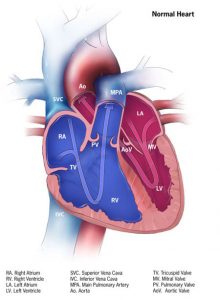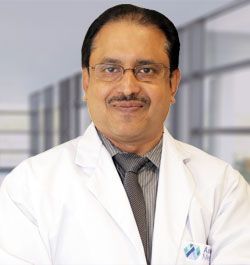
Congenital heart disease (congenital heart defect) is an abnormality in your heart’s structure that you’re born with. Although congenital heart disease is often considered a childhood condition, advances in surgical treatment mean most babies who once died of congenital heart disease survive well into adulthood.

While medical advances have improved, many adults with congenital heart disease may not be getting proper follow-up care. If you had a congenital heart defect repaired as an infant, you likely still need care as an adult.
Symptoms
Symptoms or signs of congenital heart disease may not show up until later in life. They may recur years after you’ve had treatment for a heart defect. Some common congenital heart disease symptoms you may have as an adult include:
1. Abnormal heart rhythms (arrhythmias)
2. A bluish tint to the skin (cyanosis)
3. Shortness of breath
4. Tiring quickly upon exertion
5. Dizziness or fainting
6. Swelling of body tissue or organs (edema)
Most heart defects develop when a baby is still in the womb. During the first month of gestation, the fetal heart begins beating. At this point, the heart is just a vaguely heart-shaped tube. Soon the structures that will form into the heart’s two sides and the large blood vessels that carry blood in and out of them develop.
It’s usually at this point in a baby’s development that heart defects may begin to develop. Researchers aren’t sure exactly what causes defects to begin, but they think some medical conditions, medications and genetics may play a role.
Some adults may find that problems with their heart defects arise later in life, even if their defects were treated in childhood. This is because heart defects are seldom cured — they are often repaired, so your heart function is improved, but it’s often not completely normal.
There are many reasons why heart defects re-emerge in adults. In some cases, the treatment you received in childhood may have been successful then, but the problem worsens later in life. It’s also possible that problems in your heart, which weren’t serious enough to repair when you were a child, have worsened and now require treatment. There are other complications of childhood surgeries to correct congenital heart disease that can occur later in life. Many treatments to repair heart defects may leave scar tissue behind in your heart that causes an increased chance of abnormal heart rhythm (arrhythmia).
Because congenital heart disease can be mild or severe, treatment options vary. Your doctor may suggest a treatment to attempt to correct the heart defect itself or treat complications caused by the defect. Treatments your doctor may recommend include:
Regular checkups: Relatively minor heart defects may require only periodic checkups with your doctor to make sure your condition doesn’t worsen. Ask your doctor how often you need to be seen.
Medications: Some mild congenital heart defects can be treated with medications that help the heart work more efficiently. You may also need to take medications to prevent blood clots from forming or to help control an irregular heartbeat.
Implantable heart devices: Devices that help control your heart rate (pacemaker) or that correct life-threatening irregular heartbeats (implantable cardioverter-defibrillator, or ICD) can help some of the complications associated with congenital heart defects.
Special procedures using catheters. Some congenital heart defects can be repaired using catheterization techniques, which allow the repair to be done without surgically opening the chest and heart.
In procedures that can be done using catheterization, the doctor inserts a thin tube (catheter) into a leg vein and guides it to the heart with the help of X-ray images. Once the catheter is positioned at the site of the defect, tiny tools are threaded through the catheter to the heart to repair the defect.
Open-heart surgery: If catheter procedures aren’t enough to fix your heart defect, your doctor may recommend open-heart surgery.
Heart transplant. If a serious heart defect can’t be repaired, a heart transplant may be an option.

Congenital heart disease (CHD) is the most common congenital disorder in newborns. There are no published data on the occurrence of congenital heart disease in Kerala. However there is general agreement among health workers that it follows a similar pattern all over the world in different geographies. The reported prevalence of CHD at birth ranges from 6 to 13 per 1000 live births. On an average, 8 children are born with congenital heart defects for every 1000 live births in India. Variation is primarily due to the use of different methods to detect CHD (fetal echocardiography versus postnatal referral to a cardiac center). Deriving from the crude birth rate, it…
keep reading

Congenital heart disease (congenital heart defect) is an abnormality in your heart’s structure that you’re born with. Although congenital heart disease is often considered a childhood condition, advances in surgical treatment mean most babies who once died of congenital heart disease survive well into adulthood. While medical advances have improved, many adults with congenital heart disease may not be getting proper follow-up care. If you had a congenital heart defect repaired as an infant, you likely still need care as an adult. Symptoms Symptoms or signs of congenital heart disease may not show up until later in life. They may recur years after you’ve had treatment for a heart defect.…
keep reading

Minimally invasive heart surgery (also called keyhole surgery) is performed through small incisions, sometimes using specialized surgical instruments. The incision used for minimally invasive heart surgery is about 3 to 4 inches instead of the 6- to 8-inch incision required for traditional surgery. The traditional heart surgery procedure Open heart surgery is typically done through a vertical cut placed over the middle of the chest, including full division of the breastbone.While most patients tolerate this well, it can take around 12 weeks or more before the wound is completely healed. This can seriously delay a return to normal activities. These days, it is often possible to avoid such invasive options…
keep reading
about Dr sajan koshy
Pediatric Cardiac Surgeon

Dr Sajan Koshy MS MCh is currently heading the unit of Paediatric & Congenital heart surgery at Aster Medicity. Prior to joining Aster, he was working as senior consultant and head of the department of paediatric cardiac surgery at MIMS Calicut. He started his professional career from alleppey medical college in 1988. He also functioned as a co- convener in first and second symposia on perioperative care of congenital heart disease held in Kochi in the year 2002 and 2004 respectively & as the scientific committee chairman for the national CME of cardio thoracic surgery held at Calicut in September 2007. He has Conducted many lectures in all the districts of North Kerala for the benefit of medical professional bodies to create awareness about congenital heart disease.
read more